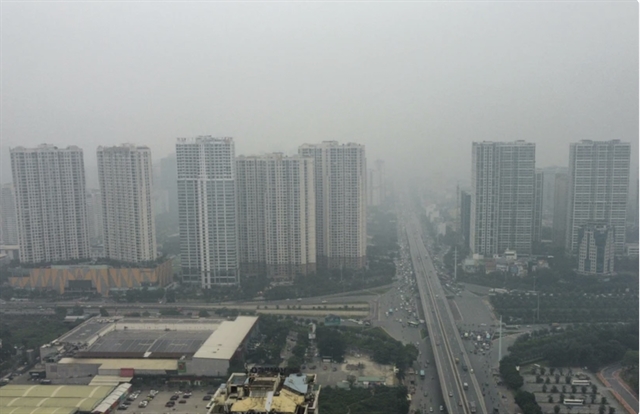 Society
Society

 |
| Hà Nội is suffering serious air pollution this week. — VNA/VNS Photo |
HÀ NỘI — The Department of Health Environmental Management (under the Ministry of Health) recommended that elementary schools and preschools consider closing if the air quality index (AQI) maintains at a hazardous level for three consecutive days.
In case of compulsory in-person school attendance, students must avoid outdoor activities or adjust study time accordingly.
According to the department, some provinces and cities in the country have experienced serious air pollution that pose risks to people's health, especially young children and people with underlying medical conditions.
Information from the World Health Organization (WHO) shows that air pollution increases the risk of acute respiratory infections, chronic obstructive pneumonia, asthma, cardiovascular disease, stroke and cancer. In addition, exposure to pollutants in the air can cause skin damage, eye diseases, and affect the nervous system and immune system.
To protect people's health from the consequences of air pollution, the department has developed recommendations to arm the public with basic knowledge in implementing preventive and health protection measures.
Accordingly, in a document sent to localities on measures dealing with the effects of air pollution, the department suggests people regularly monitor the air quality situation on the website of the Ministry of Natural Resources and Environment and provincial-level Departments of Natural Resources and Environment to take appropriate preventive and health protection measures.
Specifically, people should regularly wear quality masks properly when going out, clean rooms and houses to ventilate the living environment and use masks and eye protection when cleaning if there is a lot of dust or the air pollution is rated from poor to dangerous levels.
It is necessary to limit the use honeycomb charcoal stoves, firewood and straw.
Air quality and its impact on human health are assessed by the air quality index (AQI) that is calculated on a scale (6 AQI value ranges) corresponding to symbols and colours to warn of air quality and its impact on human health.
When the AQI is at a hazardous level at 301-500, healthy people should avoid outdoor activities and close windows and doors to limit and avoid exposure to pollutants, while environmentally-sensitive people should stop all outdoor activities, close windows and doors to limit and avoid exposure to pollutants, and monitor health, immediately going to medical facilities for examination, consultation and treatment if any acute symptoms such as difficulty breathing, cough or fever appear.
For kindergartens and elementary schools, students can be absent from school if the AQI is at a hazardous level for three consecutive days. In case of compulsory school attendance, students must avoid outdoor activities, switch to indoor activities or adjust study time accordingly.
When the AQI is poor, at 101-150, healthy people need to reduce time participating in outdoor activities, especially for people with symptoms of sore eyes, cough and sore throat, limit or avoid activities in areas with high air pollution such as streets, traffic intersections, construction sites, industrial production areas, craft villages and other polluted areas.
Students can participate in outdoor activities, but limit exercise or strenuous physical activities for long periods of time.
Environmentally-sensitive people should limit outdoor activities and strenuous physical activities and increase rest time.
This group is recommended to reduce or stop exercising as soon as symptoms such as coughing, chest tightness or wheezing appear, and clean nose and rinse throat in morning and night with saline, especially after going out, wash eyes with saline at night before going to bed and carefully monitor health, immediately going to medical facilities for examination, consultation and treatment in the event of acute symptoms such as difficulty breathing, cough or fever. — VNS




